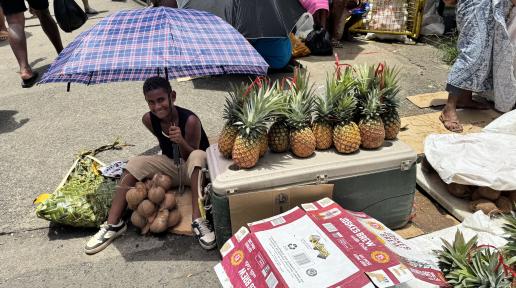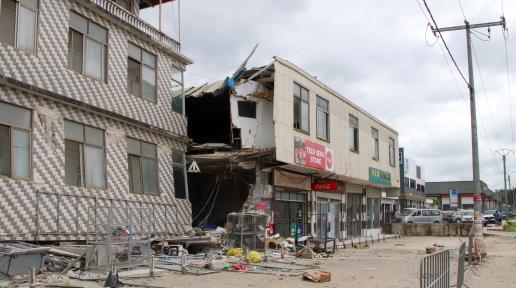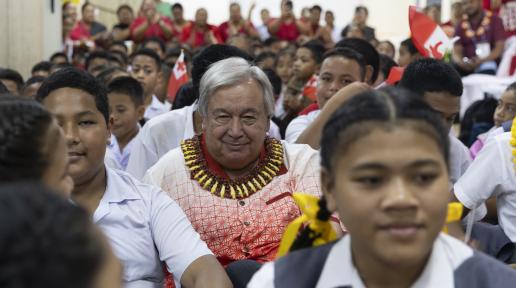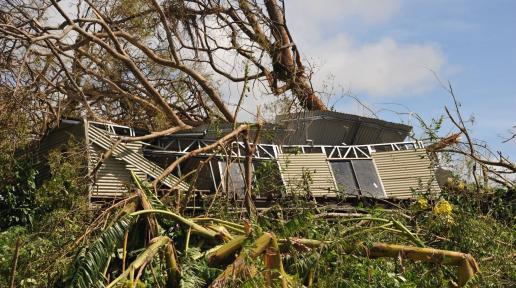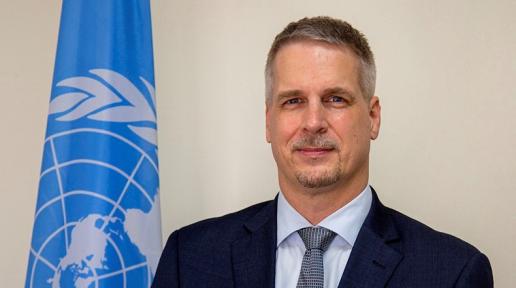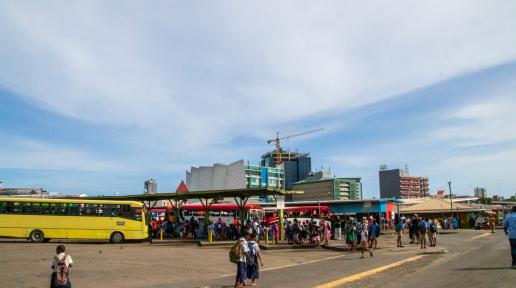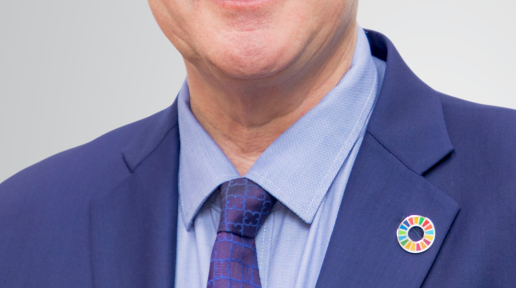Story
14 October 2025
From Ocean to Land: Tuvalu Reclaims Its Future Against Rising Seas
Tuvalu today marked a historic milestone, the completion of 8 hectares of reclaimed land under Phase II of the Tuvalu Coastal Adaptation Project (TCAP). Where ocean waters once threatened a nation’s existence, solid ground now rises as proof of what visionary leadership, international partnership, and collective resolve can achieve.Just a few years ago, UN Secretary-General António Guterres stood waist-deep in these waters to spotlight Tuvalu’s plight. Today, that same location is raised land designed to stay above sea levels beyond 2100, a striking transformation that symbolises hope, sovereignty, and the right to exist with dignity. Climate Reality at Tuvalu’s DoorstepTuvalu, the world’s fourth smallest country, comprises only 25 square kilometres of low-lying atolls much of it less than one meter above high tide. Without decisive global action, projections show that by 2050–2060, nearly half of Funafuti could flood during monthly tides, and by 2100, less than 10% of land may remain dry. For Tuvalu, a few centimetres of sea level rise means the difference between safety and submersion, between survival and displacement. TCAP: Engineering Resilience, Securing FuturesWhen the first phase of the Tuvalu Coastal Adaptation Project began in 2017, the goal was clear: to shield Tuvalu’s fragile shores from an encroaching ocean. Backed by the Green Climate Fund with US$36 million, and supported by Australia and Tuvalu, Phase I fortified coastlines across Funafuti, Nanumea, and Nanumaga, giving communities their first real defence against rising seas.Now, Phase II builds on that legacy. Funded by Australia, New Zealand, and the United States with US$17.5 million, the next chapter stretches protection to 800 meters of Tuvalu’s southern shoreline and reclaims 8 new hectares of land, a gift of security and space for generations to come.Along these coasts, protective seawalls, reef-top barriers, and berms now rise against the tide. Together, they guard homes, schools, hospitals, and cultural sites, quietly redefining what resilience looks like in the Pacific.Beyond Infrastructure: A People-Centred ApproachWhat makes TCAP unique is its holistic model. It builds both land and local capacity.Scholarships support Tuvaluan students in coastal and climate studies.Women and youth receive training in hazard management and coastal adaptation, fostering inclusion and leadership.A climate risk information system empowers future planning, while gender-responsive governance ensures all voices are heard.Every phase involved community participation, embedding traditional knowledge and local ownership.A Blueprint for Global AdaptationAs Prime Minister Feleti Penitala Teo told the 80th UN General Assembly: “If we save Tuvalu, we save the world.” Tuvalu’s success offers a model for all Small Island Developing States, proving that with leadership, science, and solidarity, nations can rise above the waves.True Multilateralism in ActionTCAP embodies global cooperation at its best — led by the Government of Tuvalu, implemented by UNDP, and supported by Australia, New Zealand, and the United States, with key technical partners SPC and Hall Contracting. It shows that when nations unite behind a shared purpose, even the smallest island can inspire the world.Reclaimed Land, Reclaimed HopeThe newly reclaimed land symbolises far more than infrastructure; it represents reclaimed dignity and destiny.
Plans are already in motion for sustainable development, guided by the Funafuti Kaupule’s Development Control Plan. The reclaimed area will provide space for housing, livelihoods, and public facilities, allowing Tuvaluans to remain on their ancestral land and sustain their way of life.A Nation Rising Above the WavesTuvalu’s story is not of victimhood, but of agency, innovation, and leadership. From climate conferences to the UN General Assembly, Tuvalu continues to champion climate justice and global solidarity. Guided by its national vision Te Kete, the government is building a peaceful, resilient, and prosperous future for all Tuvaluans.The UN stands proudly beside Tuvalu in this journey, reaffirming its commitment to help the nation build resilience, secure sovereignty, and inspire the world.Where Determination Meets PossibilityToday’s reclaimed land stands as Tuvalu’s highest physical point and a powerful symbol of what can be achieved when determination meets possibility. Tuvalu is not waiting for rescue. It is saving itself, proving that courage, knowledge, and partnership can turn an existential threat into an enduring opportunity. In the Pacific, the ocean connects us all. Tuvalu’s victory over rising seas is not just its own; it is a victory for humanity.
Plans are already in motion for sustainable development, guided by the Funafuti Kaupule’s Development Control Plan. The reclaimed area will provide space for housing, livelihoods, and public facilities, allowing Tuvaluans to remain on their ancestral land and sustain their way of life.A Nation Rising Above the WavesTuvalu’s story is not of victimhood, but of agency, innovation, and leadership. From climate conferences to the UN General Assembly, Tuvalu continues to champion climate justice and global solidarity. Guided by its national vision Te Kete, the government is building a peaceful, resilient, and prosperous future for all Tuvaluans.The UN stands proudly beside Tuvalu in this journey, reaffirming its commitment to help the nation build resilience, secure sovereignty, and inspire the world.Where Determination Meets PossibilityToday’s reclaimed land stands as Tuvalu’s highest physical point and a powerful symbol of what can be achieved when determination meets possibility. Tuvalu is not waiting for rescue. It is saving itself, proving that courage, knowledge, and partnership can turn an existential threat into an enduring opportunity. In the Pacific, the ocean connects us all. Tuvalu’s victory over rising seas is not just its own; it is a victory for humanity.

